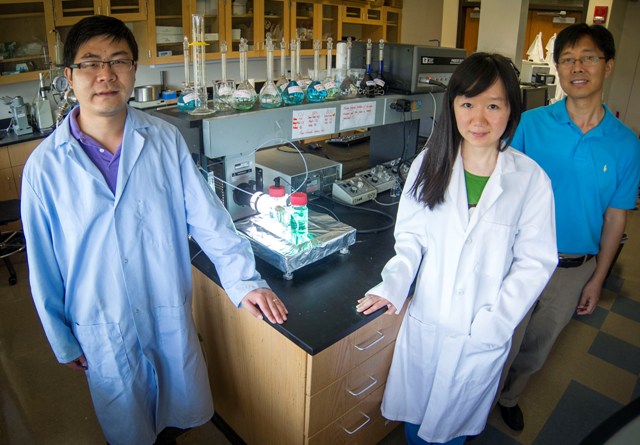Jul 2 2015
A University of Texas at Arlington materials science and engineering team has developed a new energy cell that can store large-scale solar energy even when it’s dark.
 Dong Liu (left), Zi Wei (center) and Fuqiang Liu, an assistant professor in the UT Arlington Materials Science and Engineering Department.
Dong Liu (left), Zi Wei (center) and Fuqiang Liu, an assistant professor in the UT Arlington Materials Science and Engineering Department.
The innovation is an advancement over the most common solar energy systems that rely on using sunlight immediately as a power source. Those systems are hindered by not being able to use that solar energy at night or when cloudy conditions exist.
The UT Arlington team developed an all-vanadium photo-electrochemical flow cell that allows for efficient and large-scale solar energy storage even at nighttime. The team is now working on a larger prototype.
“This research has a chance to rewrite how we store and use solar power,” said Fuqiang Liu, an assistant professor in the Materials Science and Engineering Department who led the research team. “As renewable energy becomes more prevalent, the ability to store solar energy and use it as a renewable alternative provides a sustainable solution to the problem of energy shortage. It also can effectively harness the inexhaustible energy from the sun.”
The work is a product of the 2013 National Science Foundation $400,000 Faculty Early Career Development grant awarded to Liu to improve the way solar energy is captured, stored and transmitted for use. Other members of the team included lead author Dong Liu, who recently defended his UT Arlington Ph.D. dissertation in 2015, and Zi Wei, a UT Arlington doctoral candidate.
The research is detailed in “Reversible Electron Storage in an All-Vanadium Photoelectrochemical Storage Cell: Synergy between Vanadium Redox and Hybrid Photocatalyst,” in the most recent edition of the American Chemical Society journal ACS Catalysis.
Khosrow Behbehani, dean of the College of Engineering, said the groundbreaking research has the potential to positively impact on the way we generate and consume energy.
“Dr. Liu and his colleagues are working to help us shape a more sustainable future and are taking innovative steps to improve our ability to harness and use one of the larger sources of energy available to us – the sun,” Behbehani said.
Dong Liu, lead author of the paper, said a major drawback of current solar technology is the limitation on storing energy under dark conditions.
“We have demonstrated simultaneously reversible storage of both solar energy and electrons in the cell,” Dong Liu said. “Release of the stored electrons under dark conditions continues solar energy storage, thus allowing for unintermittent storage around the clock.”
Wei, another co-author of the paper, said that the research should allow solar energy storage to be done in a much higher capacity and on a much larger scale.
“Using an all-vanadium photo-electrochemical cell gives our energy storage an edge over other systems,” Wei said. “This cell allows us to attain higher storage capacity in a smaller unit. ”
About The University of Texas at Arlington
The University of Texas at Arlington is a comprehensive research institution of more than 50,600 students in campus-based and online degree programs and is the second largest institution in The University of Texas System. The Chronicle of Higher Education ranked UT Arlington as one of the 20 fastest-growing public research universities in the nation in 2014. U.S. News & World Report ranks UT Arlington fifth in the nation for undergraduate diversity. The University is a Hispanic-Serving Institution and is ranked as a “Best for Vets” college by Military Times magazine. Visit www.uta.edu to learn more, and find UT Arlington rankings and recognition at www.uta.edu/uta/about/rankings.php.
Source: http://www.uta.edu/